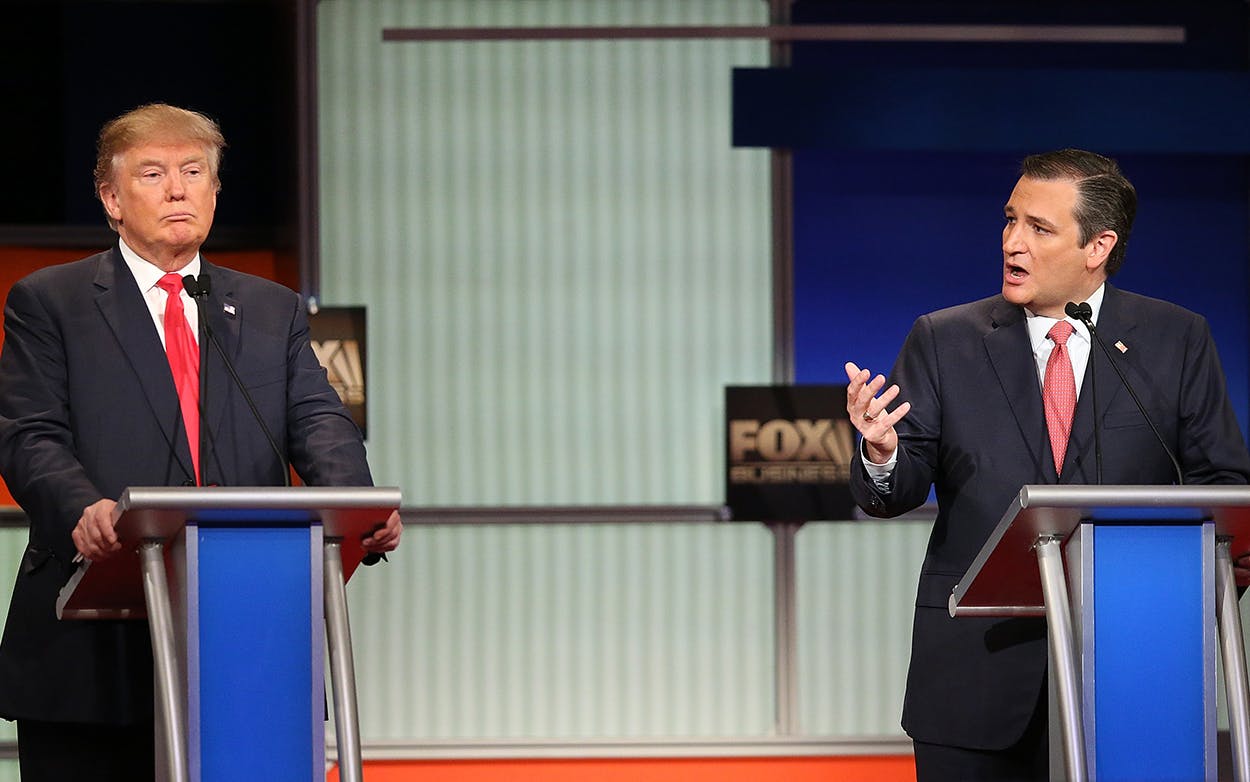It’s typical of politics that, during a primary, candidates bash each other for months—and then, once one of them has secured the nomination, their former opponents line up to talk about what a swell person the victor is. The relationship between Donald Trump and Ted Cruz, though, was always a little more complicated than that. And that complicated relationship is coming back to haunt Cruz in the form of a mobile billboard—featuring one of Trump’s harsher tweets about the state’s junior senator, planned for a site outside of the yet-to-be-announced sites of the president’s rally for Cruz on October 3.
The billboard was crowdfunded by Houston activist Antonio Arellano, in partnership with #resistance figure Claude Taylor and Parkland shooting survivor David Hogg. The trio posted the campaign on GoFundMe on September 1, and quickly raised more than the $6,000 needed to host the billboard. (After hitting $9,760, the campaign stopped accepting donations.)
https://twitter.com/AntonioArellano/status/1036050036038291457
On February 28, 2016—the day before the Texas GOP primary—Trump tweeted about Cruz, the only other candidate in the GOP primary field who appeared to have a chance of securing the nomination, “Why would the people of Texas support Ted Cruz when he has accomplished nothing for them? He is another all talk, no action pol!”
The harsh words from the future president were typical of their relationship. Trump called Cruz “Lyin’ Ted,” threatened to “spill the beans” about Cruz’s wife—no additional context was ever provided—and accused Cruz’s father of helping plot to assassinate John F. Kennedy. All of that goes well beyond the typical “What my distinguished opponent fails to consider…” rhetoric we come to expect from political disagreements between members of the same party during a primary, but such is life under Trump. For his own part, Cruz went back at Trump pretty hard: He called Trump a “sniveling coward” and, demonstrating his affinity for pop culture, channeled Aaron Sorkin-via-Michael Douglas by hitting Trump with a line from The American President. He stood his ground well past the point where there was a direct benefit for him in doing so, too—during the 2016 GOP convention, Cruz drew boos from the crowd during his speech by refusing to endorse the party’s nominee, urging instead that those watching vote their conscience.
Still, the relationship thawed over time. Cruz changed his opinion of Trump in the final months of the 2016 campaign, eventually allowing himself to be photographed phone-banking for the future president, and Trump softened his rhetoric around Cruz in return. Since Trump assumed office, Cruz has been a fairly reliable vote, siding with the president more than 90 percent of the time (although it’s worth noting that this only puts him in the bottom third of sitting GOP senators, in terms of their support for Trump’s agenda). On Tuesday, during the first day of hearings on Trump’s second Supreme Court nominee, Brett Kavanaugh, Cruz spent a substantial amount of time on the Senate floor talking about Trump’s 2016 opponent, Hillary Clinton—the sort of performance that tends to play well before the president.
After Trump announced that he’d be coming to “the biggest stadium in Texas we can find” in support of Cruz (which presumably means Kyle Field in College Station, the fourth-largest stadium in the nation by capacity, capable of holding almost 3,000 more people than Austin’s Darrell K. Royal Stadium or Arlington’s AT&T Stadium), Cruz tweeted his gratitude.
Terrific! Texas will be glad to see you. Working together, we’ve won major victories for the people of Texas: historic tax cuts, repealing job-killing regulations, rebuilding the military & confirming strong constitutionalist judges. And as a result, the Texas economy is booming! https://t.co/BkeHpUo1pn
— Ted Cruz (@tedcruz) August 31, 2018
How glad Texas will be to see Trump is something of a question. According to data clearinghouse FiveThirtyEight, Trump’s approval in the state went from +20 shortly after his inauguration to just +5 in June of this year. That said, there are still plenty of Texans who support the president, and it shouldn’t be hard for him to fill a stadium—or several, as plans announced on Tuesday afternoon indicate that Trump will be holding several events throughout the state on October 3. It’s unclear at the moment whether Trump’s schedule will lead to additional mobile billboards, or if Arellano, Taylor, and Hogg think their truck will be able to keep pace with the president’s travel schedule—but if they decide to raise more money, the speed with which they hit their last goal suggests they shouldn’t have much trouble getting more Trump tweets plastered across the state.
- More About:
- Politics & Policy
- Ted Cruz
- Donald Trump
- Beto O'Rourke








